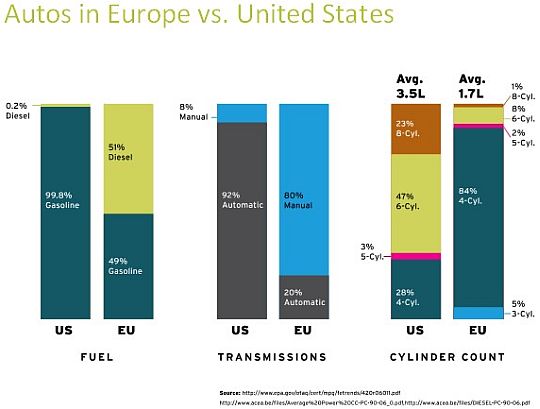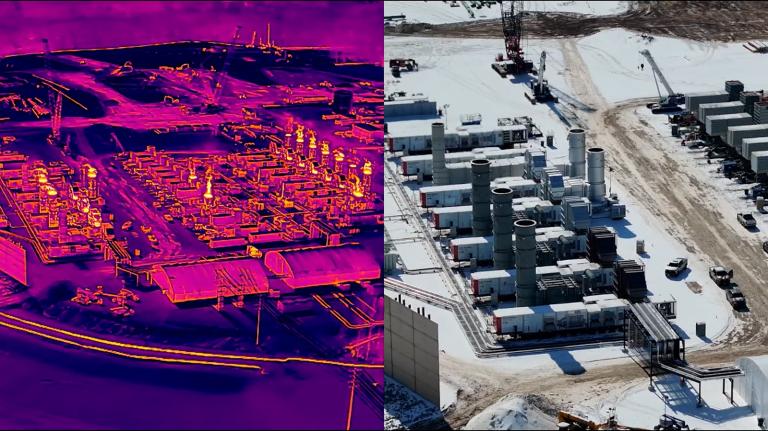I frequently read about perceived (or alleged) disagreements between the environmental community and the auto industry. A few of them are real disagreements over policy, many are practical disagreements over how best to achieve common goals, but many perceived disagreements are not, in fact, disagreements at all.
For instance, some people believe the auto industry stands in the way of higher average fuel efficiency in the U.S. That’s just not the case, which I’ll explain in a moment. First, an area of agreement: in his New York Times column, Paul Krugman writes about fuel efficiency and our automotive future:
Europeans who have achieved a high standard of living in spite of very high energy prices — gas in Germany costs more than $8 a gallon — have a lot to teach us about how to deal with that world. If Europe’s example is any guide, here are the two secrets of coping with expensive oil: own fuel-efficient cars, and don’t drive them too much. Notice that I said that cars should be fuel-efficient — not that people should do without cars altogether. In Germany, as in the United States, the vast majority of families own cars (although German households are less likely than their U.S. counterparts to be multiple-car owners).
But the average German car uses about a quarter less gas per mile than the average American car. By and large, the Germans don’t drive itsy-bitsy toy cars, but they do drive modest-sized passenger vehicles rather than S.U.V.’s and pickup trucks. In the near future I expect we’ll see Americans moving down the same path.
This may come as a surprise to some people, but … we agree. In fact, this is what we in the auto industry have been saying all along. Automakers don’t simply watch the latest sales figures and crank out whatever cars consumers wanted last month. For years now, we’ve been developing new designs and new technologies. However, the key is not what the auto industry is willing to make — we make more than 70 models of alternative fuel automobiles available, and more than 100 models that have fuel economy ratings of more than 30 mpg on the highway — but what consumers will buy. The fact is that from May 2002 to March 2008, we have only had one month where passenger cars outsold light trucks. Why? Because, despite a few spikes, gas was relatively inexpensive.
But with gas prices climbing — and staying high, rather than fluctuating back and forth — consumers are actually changing their habits, changing driving patterns, and buying more fuel efficient cars. They’re doing it because the market works. People respond to incentives. Gasoline at almost $4.00/gallon is doing more, faster, for fuel efficiency than any government regulations.
This sustained increase in the price of gas is what we have been saying is needed to drive a significant increase in the fuel efficiency of the cars American choose to drive.
The only complaint I would have with Krugman’s piece is the oversimplification of the difference between Germany (EU) and the U.S. There are glaring differences in diesel penetration, transmissions, and cylinder counts, all illustrated in the following chart:

Contrary to Krugman’s assertion, the vehicles sold in Europe are much different than the U.S. Those differences have an impact and that fact that should be recognized. In fact, this is a point the Wall Street Journal brought up last year, pointing out:
A main reason Europeans buy smaller, diesel-powered vehicles is that fuel taxes are heavier on gasoline than diesel, and diesel vehicles enjoy other tax breaks. In the U.S., diesel fuel has at times cost more than gasoline. Add stern clean-air regulations, and diesels claim less than a 1% market share in the U.S., according to Ward’s Automotive Group.
The auto industry really does want to be part of the solution, and we’ve been developing the green technologies and car designs for many years so that we will be ready for this emerging shift in consumer demand. However, to do what needs to be done — enhance energy security, reduce greenhouse gas emissions, and ultimately lower the price at the pump — we need a comprehensive policy that addresses not only vehicle fuel efficiency but also alternative fuels, refueling infrastructure, and consumers, too.


